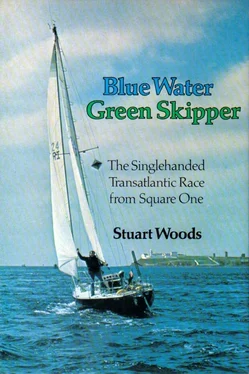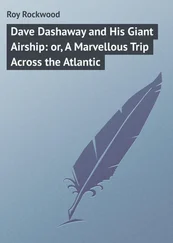We got the featherlight floater down in the freshening winds and continued under the genoa, both of us too exhausted to set the heavier all-round radial spinnaker. Each of us slept soundly when off watch that first night.
We sailed most of the next day with the boomed-out, big genoa, still too tired to get a spinnaker up. The weather was sunny and warm, and we let Fred steer while we lay on the decks and rested. Shirley felt better for a time, then returned to her original condition. She refused all offers of aspirin to lower her temperature, and by late afternoon Bill was saying that we were fast approaching the point where we would have to decide whether to put her ashore in Plymouth. It was not much of a decision. Shirley was only a passenger in her condition, and her condition wasn’t improving. We altered course for Plymouth.
Our vague plan had been to sail the boat somewhere pleasant after we’d dropped Shirley, if it came to that, somewhere that I could sail back from single-handed in order to qualify for the OSTAR. But now I was very dissatisfied with this notion. I put it to Bill that we go on to the Azores. After all, the boat had been repaired, we were thoroughly overprovisioned for the passage, the boat was easily managed by two, and our exhaustion was beginning slowly to slip away. Bill readily agreed, to my everlasting relief. I would have been very unhappy if, after all this preparation, we had been forced to change our plans. Now we began to plan how to lose as little time as possible in Plymouth. Our first plan had been to pick up a mooring in front of the Royal Western Yacht Club or to put into the Mayflower Marina and get a night’s rest before continuing. But since deciding to continue to Horta we were in more of a hurry. I got on the VHF and contacted Rame Head Coast Guard as we approached Plymouth. They said they would arrange for the pilot boat to take Shirley off at the breakwater and would ring Richard to collect her ashore. We pressed on.
Near midnight, as we approached Plymouth breakwater, we were able to contact the Plymouth pilot boat directly on the radio-telephone, and they soon spotted us, sailing slowly under main only, with the deck lights on. They came skillfully alongside and took off Shirley, her suitcase, and an incredible number of plastic shopping bags. As we prepared to get under way again there was a shout from the pilot boat. Shirley had forgotten a shopping bag. We repeated the performance, tossed the last bag over, then were free. Bill took the first watch and set a course for the point where we had left our original course. Our plan was to return there before continuing to Horta, keeping a record of our lost time in order to appeal to the committee in Horta to subtract this from our elapsed time. We would also appeal not to be disqualified.
When I came on watch Bill reported that we had been sailing through thunderstorms with gusts up to Force seven and that he had reefed everything and been up the mast twice to retrieve or sort out halyards. I had slept through everything. On my watch little happened except a fishing boat that wouldn’t go away, and I spent an hour making sure we didn’t hit him or foul his nets. Later in the day I telephoned a committee member and reported our loss of crew and lodged our request to remain in the race and be credited with the eleven hours it had cost us to put Shirley ashore and return to our original course. He said they would let us know in Horta. I then telephoned my mother in the United States and Ann, who had returned to London, to let them know of our progress before we were out of range of Land’s End radio. I don’t know what the Land’s End operators say when they ring a telephone number, but it never fails to astonish anybody who is getting a telephone call from sea. They can never quite believe that it is possible for a small boat out of sight of land to make a telephone call. It is great fun.
It was now Tuesday afternoon, August 5 (we had started at seven p.m. on August 2), and the wind was freshening and heading us, an experience which was to be repeated ad nauseam for the rest of the passage. We reefed and began to beat. We did not know it at the time, but nearly two weeks later we would be still in identical conditions. At three a.m. the preceding morning I had been wakened by Bill. I was beginning to understand that not only was he a natural pessimist, but that he actually seemed to enjoy it when things went wrong. When anybody else would have been depressed and cursing his fate, Bill seemed stimulated.
“What?” I mumbled, rolling over and trying not to let any heat escape from my sleeping bag.
“Bad news,” Bill chirped. I was sure I could see his teeth in the darkness. I was sure he was grinning. The engine battery had shorted and was completely flat. I was sleeping on the hatch to the battery compartment. I struggled out of my sleeping bag and got at the battery. An untaped lead had rubbed against something. I taped it, switched the battery leads to start the engine, and began to disappear into the sleeping bag again.
“I’ve been thinking it over,” Bill said. “I think we should turn back.” I woke up again.
“What?”
“I’m old and weak,” said Bill. “You’re young and strong, but inexperienced. We’ve had this battery trouble and the Dynafurl is going to break at any moment. It’s your decision, but I just want to put my view to you. If you decide you want to go on to Horta, we’ll do so.”
I was silent for a moment. “Old and weak” was not a new theme. Bill King is a small but wiry man, and he is well muscled from manual labor on his farm. I suspected that he was stronger than I. In reflective moments he would bemoan his old age, referring to himself as “... nearly seventy.” He was not yet sixty-four. Once, over dinner, he’d remarked how well he was feeling, how youthful. I’d pounced: “But a couple of days ago you were practically on your deathbed.” “Ah, but now I’ve had half a bottle of wine,” he replied with a grin.
I thought that now I detected a trial balloon of some sort, but I was too sleepy to give him the persuading he seemed to want. “I’ll sleep on it,” I said, “and we’ll talk about it in the morning, okay?” I knew that we would cover another fifteen or twenty miles while I slept. The next morning the sun was shining and Harp was going well to windward. Bill remarked what a seakindly boat she was. “She goes to windward so much more comfortably than Galway Blazer, with her big spoon bows for running in the Southern Ocean,” he said admiringly.
“Listen, Bill,” I said, “everything’s going well now. The batteries are fully charged, and if the Dynafurl breaks again it’s simple to fix with our new tools. We’re both feeling better every day. I think we should go on.”
Bill nodded. “Right. We’ll say no more about it.”
We went on.
A week out. I was sitting in the cockpit in the late evening, enjoying the view. There is nothing, absolutely nothing, as beautiful at sea as the sky at night. There seem to be at least four times as many stars as on land, and the Milky Way is just that, a great white swath across a black universe. Then I heard a new noise.
Sailing is not as quiet a pastime as many people seem to believe it to be. Every sailboat is accompanied by a constant little concerto of sounds — water sweeping past the hull, halyards flapping against the mast, the leach of a sail shaking in the wind. A new sound means that something, however small, has changed. The sound I heard now was coming not from the boat but from the water. I looked over the starboard rail and saw, lit by its phosphorescent progress through the sea, a torpedo coming straight for the boat.
It is amazing how many thoughts and images can pass through the mind in a second or two. I saw the yacht erupt in the explosion, and myself flying through the air, then I thought, Nonsense, nobody would torpedo a small boat; anyway, I can see that the torpedo is a living thing. It was a great white shark or killer whale. Bill King had been attacked by one in the Southern Ocean, now it was happening to us. I saw the boat, holed and sinking, while we scrambled into the vulnerable life raft and the creature circled the crippled yacht, waiting. Inches from the hull, the great white “shark” veered sharply away from the boat, as if he had ricocheted. I discovered that I had been holding my breath.
Читать дальше












